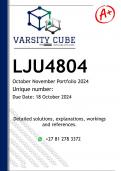LJU4804
October November Portfolio 2024
Unique number:
Due Date: 18 October 2024
Detailed solutions, explanations, workings
and references.
+27 81 278 3372
, QUESTION 1
1.1.
In terms of South African private international law, the legal system that applies to
the formal validity of a marriage is determined by the law of the place where the
marriage was celebrated (lex loci celebrationis). Since John and Mary were married
in Hawaii in December 1983, the law of Hawaii would govern the formal validity of
their marriage. Thus, Hawaiian law applies to the formal requirements of their
marriage, such as whether the marriage was properly solemnized according to the
legal standards in Hawaii.
1.2.
In private international law, domicile is determined by both physical presence and
the intention to remain in a particular place indefinitely. At the time of entering into
the marriage in December 1983, the South African court would need to assess
John's domicile by considering two key factors:
1. Physical Presence: The court would examine where John was physically
present before and during the marriage. In this case, John was working in
New York on a fixed-term contract at the time of the marriage.
2. Intention to Settle: The court would also look at John’s intention regarding
where he intended to make his permanent home. Although John was living
in New York temporarily, he was in negotiations for a permanent position in
South Africa before the marriage. If John intended to settle in South Africa
permanently once he secured the job, his domicile at the time of marriage
would be South Africa. However, if his intention at the time was to remain in
New York indefinitely, that could indicate domicile in New York.
The court will assess whether John had formed a fixed intention to reside
permanently in South Africa by considering his negotiations for the job and other
relevant factors. Since domicile is determined by a combination of physical
presence and intent, the court would ultimately make a fact-based determination
on whether John had an intention to remain in South Africa at the time of marriage.
Varsity Cube 2024 +27 81 278 3372
, 1.3.
The lex domicilii matrimonii rule states that the proprietary consequences of a
marriage are governed by the law of the husband's domicile at the time of marriage.
This rule was affirmed in several South African cases and has roots in Roman-
Dutch law. The key question in this case is whether South African law applies
because John and Mary later established a domicile in South Africa after their
marriage.
At the time of the marriage in Hawaii in 1983, John was domiciled in New York as
he was working on a fixed-term contract in the United States, and Mary was
domiciled in London. Under traditional principles, the proprietary consequences of
the marriage would have been governed by the law of the husband's domicile at
that time (likely New York law). However, the couple later relocated to South Africa,
and Mary is now arguing that their intended matrimonial domicile was South Africa,
given John’s negotiations for a permanent position with a South African company
before the marriage.
In Sadiku v Sadiku 30498/06 (unreported), the court dealt with a similar issue
regarding the governing law of the proprietary consequences of a marriage. The
court found that while domicile at the time of the marriage is traditionally the
deciding factor, there are exceptions where the parties had an expressed or implied
intention to establish a matrimonial domicile in a different jurisdiction. If it can be
shown that John and Mary intended to establish a permanent home in South Africa
before the marriage, Mary’s argument that South African law should govern the
proprietary consequences gains strength. The Sadiku case suggests that the court
may consider the parties' intention and actual relocation after marriage when
determining the applicable law.
Neels and Wethmar-Lemmer’s Article
According to Neels and Wethmar-Lemmer (2008 TSAR 587-596), the authors
discuss the evolving understanding of matrimonial domicile and emphasize that the
modern interpretation of the rule allows for greater flexibility. They argue that courts
should take into account the expressed or inferred intentions of the parties when
determining the applicable legal system. If the parties had negotiated a future in
Varsity Cube 2024 +27 81 278 3372




